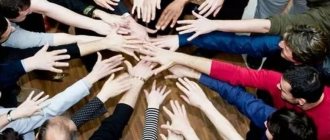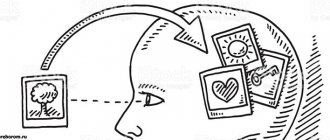Introduction
The topic of the test is relevant because the crisis experienced by Russian society, which has not yet ended, is characterized by the exacerbation of many social problems generated not only by economic reform, but also by the collapse of the value system and a decline in morality. The destruction of higher, transpersonal humanistic values that determine the strategic goals of development, ideals and meaning of both personal and public life naturally leads to a sharp decrease in the value of human life, the individual as such, and neglect of it. his honor and dignity. The moral self-destruction of society is proceeding faster than the formation of “new” humanistic values.
A gradual, slow, fundamental reassessment of the goals of modern civilization and a rethinking of traditional values inevitably occurs. The highest value of society is officially proclaimed to be a person - a person, regardless of his material wealth, ability to work, state of health, education, intellectual abilities, marital status, gender and age, race and nationality, views and beliefs, etc.
The state assumes primary responsibility for the well-being of each citizen, granting him certain rights and declaring their implementation, but also encourages charitable activities of citizens and organizations aimed at providing comprehensive assistance to those in need, since for the benefit of each person this is the concern of both the state and the person himself, and his surroundings. Concern for the well-being of everyone and the welfare of society must become the foundation on which a new society can be built - a society in which every person will have the opportunity for full self-realization.
Personality formation in domestic and foreign psychology
From the point of view of considering activity and personality formation in psychology, the theory of E. Erikson is interesting.
It is believed that a person goes through eight stages, in each of which there is a conflict between the opposing forces of his personality. A successful outcome entails the development or formation of new traits. In the opposite situation, neurosis and maladjustment are observed.
Personality formation in psychology according to E. Erikson involves stages where the following contradictions arise:
- trust and distrust in the world around us - lasts from birth to one year;
- independence and shame, doubts – up to 3 years;
- initiative and guilt – in the period from 4 to 5 years;
- hard work and feelings of inferiority – 6–11 years;
- awareness of belonging to a certain gender and lack of understanding of its characteristic behavior - from 12 to 18 years;
- the desire for intimate relationships and a feeling of isolation from others - the stage of early adulthood;
- vital activity and focus on one’s problems, needs, interests - observed during middle adulthood;
- a feeling of fullness of life and despair - late adulthood.
Concept of society and social relations
Every living organism treats nature as its part, directly appropriating natural material in the process of satisfying its needs. Man, unlike other living beings, is not directly related to nature, although he is part of it. A person’s relationship to the natural environment around him is mediated by a system of social relations that develop between people in the course of their lives. The nature and forms of human appropriation of natural material significantly depend on the system of social relations of which he is the bearer, and on his place in this system of relations.
The system of all social relations that develop between people in the course of their lives is called society.
Thus, a person does not relate to nature directly, but through society, a system of social relations that connects him with other people. Consequently, the appropriation of natural material by man is mediated by society and is of a social nature, like the entire process of human life.
A person acts as a subject of a system of social relations and, thus, is a social being. Thus, a person, in addition to his inherent biological form, like any living organism, as a representative of a certain biological species, is endowed with social content determined by the logic of the system of social relations.
The social relations that develop between people in the course of their lives are material and constitute a social form of the movement of matter, the highest and most complex of those studied by modern science. Each form of matter movement contains all the previous ones in the form of a film, therefore a person cannot be free from the laws of development of any form of matter movement.
The system of social relations between people is historical in nature; it changes as humanity develops, passing through a number of successive stages in the process of its evolution. The laws governing the processes of formation, development and death, as well as the successive change of various systems of social relations with each other, act as laws of social development and form the subject of study of the social sciences.
Let us note that the idea of society as a collection of people, which has dominated social thought for a long time, does not allow us to identify any subject of study of the social sciences. After all, science must study laws, that is, stable, significant objective connections and relationships based on the repeatability of phenomena. However, the repetition of phenomena in the life of an individual or a community of people (country, people, etc.) never appears in its direct, absolute form, but always appears to us in certain relative forms, burdened with non-repeating individual forms. circumstances.
Consequently, in order to isolate essential and universal connections from the chaotic diversity of social life in all its particular manifestations, it is necessary to apply the method of scientific abstraction. The contours of the subject of social science, which operates with this method of scientific abstraction, directly depend on the nature of this abstraction, on what features of people’s social life it considers significant and subject to research.
In any field of scientific knowledge, the method precedes the subject and, in a certain sense, defines and outlines it. The features and aspects of the objects being studied, which the method of this science identifies as subject to research, form a system of categories of this science, and objective universal essential stable relationships between them form a system of its laws.
The dialectical-materialist method of studying social life, developed and first applied by K. Marx, leads to the idea of society as a system of all social relations. This idea creates objective grounds for the discovery and study of the laws of social development, since from this position individual facts and events of social life, seemingly incomparable and devoid of internal connection, are, in fact, built into a consistent logical system. which is based on a system of relationships that develop between people during their lives.
Humanity treats nature as its constituent part, but not as an organic part, the development of which is completely determined by the laws of development of the whole, but as a part that is subject in its development to the laws and relations of a higher level. form of movement of matter. Because of this, humanity views nature as a part opposed to the whole.
Consequently, the contradiction between humanity and its natural environment finds its expression and resolution in the process of man’s transformation of this environment, in the form of which his conscious activity occurring within and through this natural environment is manifested.
Theories of personality formation in psychology
Different areas of psychology consider the process of personality formation in their own way. There are psychodynamic, humanistic theories, trait theory, social learning theory, etc.
A number of theories have become the result of experiments, while others remain untested in practice. It must be understood that some teachings do not consider human life from birth to death, since it is believed that personality formation occurs in the early years or before reaching adulthood.
The theory of the American psychologist Erik Erikson is considered to be the most holistic, including a number of positions on this issue. He argued that personality is formed according to the epigenetic principle, that is, throughout a person’s life, he goes through eight stages of development. Moreover, such stages are determined genetically and are not influenced by social factors or even the individual himself.
Dynamics of Russian society and globalization
As Anthony Giddens notes, criticism of the Enlightenment, the expression of which is the theory of postmodernism, can be perceived as the development of modern, that is, modern philosophical, scientific, artistic thought. Globalization is our current stage in the deployment of a single and universal “modern project”. Globalization, manifested in the movement towards a universal economic, legal, information, educational and, ultimately, cultural space, is a stage of modernization.
Modern Russian society has entered the era of globalization, which has embraced the economic, political and cultural spheres of public life. This phenomenon was facilitated by certain factors, among which the main one is the development of information systems and the emergence of the Internet. This entailed significant changes in the information and communication space itself, which could not but affect such a component of it as public relations (PR) - public relations R is a special type of social communication - a certain subsystem aimed at creating effective public relations . discourses and optimization of information interactions between a social subject and its public (otherwise this is a special type of socio-communicative activity).
But a person, accustomed to continuity and stability in the transition from the past through the present to the future, is not aware of the new conditions of existence. To be able to live in a constantly changing world, with new, previously unknown rates of transformation, Russian society must become different.
Scientists and practitioners (and society as a whole) are faced with the task of changing the approach to a person, to his relationship with the world, and thereby helping people adapt to new conditions and be able to act adequately in order not only to survive, but also to achieve success. First of all, you need to be able to cope with the new product. The question arises about raising and training a new (different) person who would feel comfortable in these conditions of rapid change, who would be able to act without fear in situations that have never arisen before, relying on their abilities, hidden capabilities, and could improvise their actions and making decisions, also relying on one’s knowledge. “A society that can raise such people will survive,” says A. Maslow, “and those societies that cannot cope with this will perish.” This requires new concepts for teaching young people, which would be determined by the specifics of the present time, which sets the main task of training future specialists as creative individuals with a new worldview, aimed not so much at the product of creativity, but at the creative process itself, when the creative approach becomes a priority.
Over the past decade (the “transit period”), Russia has undergone dramatic, including destructive, changes. All spheres of social life in our time are permeated with a general novelty of the social climate. Here and there new phenomena appear as a result of various transformations in the economy, politics and culture, as well as in mass consciousness and collective behavior; There is no need to be afraid of this, but to greet innovations with joy. This needs to be taught.
However, as shown above, for the current situation in Russia, taking into account all possible manifestations of the peculiarities of its social development, the most important issue is the problem of the relationship between man and society, and more broadly, the relationship between people. people (“personalities”), as well as relationships between different human communities and, ultimately, intercultural relationships.
Now the world of our culture is a great many different people, not necessarily outstanding individuals or people who "have the right to decide", but people with individual characteristics, so they cannot be considered as "masses of workers" or "masses". population.
Fear of death
People probably already knew some of the healing properties of herbs. They gained this knowledge by observing the behavior of sick animals, instinctively looking for medicinal herbs. People passed on their knowledge from generation to generation. But nevertheless, this knowledge was not enough, and the simplest diseases and wounds could lead to death.
Like the Neanderthals, Homo sapiens feared the dead. The corpses were burned, placing the deceased directly in a hearth with a blazing fire, or walled up in caves, blocking the entrance with stones, or buried in dug graves. In the latter case, the dead were often buried in a crouched position and even tied up. Heavy stones were placed on the head, chest and legs, which was supposed to prevent the deceased from rising and returning to the world of the living. In the burials they find the remains of rich offerings to the deceased: weapons, jewelry and food. Thanks to the burials, we have learned a lot about the life of our ancestors - after all, it is the objects placed in the graves that are best preserved to this day.
BONE ITEMS: 1 — needles 2 — spear tip 3 — harpoon 4 — tops of the “staffs of the chiefs”
Transformation of the socio-political and economic life of Russia
Level and quality of life: the current state of affairs in Russia" is one of the most important and relevant topics today. The topic of the test is relevant, since the level and quality of life are one of the most important socio-economic categories that characterize the well-being of the country's population.
A real increase in these indicators is the main criterion of socio-economic progress. Therefore, at the present stage, issues of improving the quality and standard of living of the population, that is, well-being, which is not only the result, but also an absolutely necessary prerequisite for economic growth, are of particular relevance in the domestic economy.
Russia entered the new year 2009 with a more stable economy than in previous years. The main reason is the real acceleration in economic growth, which has led to improved functioning of various sectors of the economy. But it is known that economic growth does not always automatically lead to social progress and an increase in people's living standards.
Ignoring issues of level and quality of life does not allow modern society to develop effectively. The main difficulty in promoting reforms in modern Russia is that they come from above, without discussion with the population, with the public.
The ultimate goal of social development in Russia is to improve the standard of living of the population.
Standard of living is an economic category and social standard that characterizes the degree to which people’s physical and social needs are met. The main components of the standard of living are: health, nutrition and income of the population, housing conditions, household property, paid services, cultural level of the population, working and leisure conditions, as well as social guarantees and social protection of the population. the most vulnerable citizens.
Social guarantees are a system of society’s obligations to its members to satisfy essential needs. The state, by giving guarantees, declares that society undertakes to create conditions for each member of society to carry out their economic activities and earn income.
Social protection is a system of measures taken by society to ensure the necessary financial and social status of citizens. The standard of living must be considered in connection with general economic indicators, as well as with indicators linking the general economic level and standard of living with the income of the population, consumer demand, trade, prices, the state budget and loans. For example, income of the population is a key factor determining the standard of living.
It is necessary to identify the components of the standard of living, certain types of human needs, the satisfaction of which constitutes the main part of the standard of living as a whole (for example, nutrition, health, education, etc.). The set of components covers the entire range of human needs.
In many countries, to assess the standard of living, the “well-being of society” indicator is used, which symbolizes the minimum level of consumption and is an indicator of the poverty line.
The subsistence minimum is a valuation of the total consumption of a person or family, determined on the basis of the minimum consumer basket. The “basket” provides the structure of consumption, the expenses of the poor, and contains a set (minimum standards) necessary for physiological survival. This set and the living wage itself depend on the level of socio-economic development of the country and are adopted on the principle of distribution. Currently, this economic category does not make sense, since more than 40 million Russian citizens live far below the poverty line.
At the current level of economic growth and production, the state is not only unable to raise the poverty line, but also to compensate for the difference between the “bottom” and the minimum consumer budget. The minimum consumer budget, or subsistence budget, is calculated per capita and for its main socio-demographic groups throughout the Russian Federation and in the constituent entities of the Russian Federation.
Tools, clothing, jewelry
Neoanthropus has gone far ahead compared to Neanderthals. He significantly complicated his tools, making them from different types of stone, bones, horns and wood. Homo sapiens was well armed. When hunting, he used spears and darts with bone and stone tips, a bow and arrows. People also mastered fishing, made hooks and fishing rods, and later primitive boats.
Many special scrapers for tanning leather were found at the sites. Clothes were sewn from tanned skins with bone needles, using animal sinews instead of threads. There is no reliable information about the clothing of neoanthropes. But it can be assumed that in the summer they walked naked or wrapped pieces of skin around their thighs, and in the winter they wrapped themselves in fur clothes, making a kind of pants and jackets with hoods. The clothes were equipped with intricate fastenings and decorations. In some burials, many drilled shells were found, which were probably sewn onto unpreserved clothing. Archaeologists have found many bracelets and necklaces made of bones, shells and teeth.
ANCIENT CARVER
Not only clothes were decorated. Feathers were woven into hairstyles, and the body was painted with colored clays. This suggests that people already cared about their appearance back then. Perhaps ancient people, when decorating themselves, followed some kind of ritual rites. It should be noted that the first insignia began to appear, for example, the so-called “rods of chiefs”, found during excavations of ancient sites. These bone products with a round hole at the end, often decorated with carvings, could serve as a sign of a sorcerer or leader.
Religion as the basis of modern social life of Russians
Religion in Russia The current (1993) Constitution of Russia defines the Russian Federation as a secular state.
The Constitution guarantees "freedom of conscience, freedom of religion, including the right to profess, individually or in community with others, any religion or not to profess any religion, to freely choose, hold and propagate religious and other beliefs and to act in accordance with them." Federal Law No. 125-FZ of September 26, 1997 “On Freedom of Conscience and Religious Associations” confirms “equality before the law regardless of attitude to religion and beliefs.”
Religious and national restrictions, legally enshrined in the laws of the Russian Empire, were abolished by the Provisional Government on March 20, 1917.
In Russia there is no special federal government body designed to monitor compliance with legislation by religious associations (in the USSR it was the Council for Religious Affairs under the Council of Ministers of the USSR); however, according to experts, amendments to the Federal Law “On Freedom of Conscience and Religious Associations” of September 26, 1997, introduced in July 2008, may indicate the imminent creation of a corresponding “authorized executive body.”
The main religions represented in Russia are Christianity (mainly Orthodoxy, there are Catholics and Protestants), as well as Islam, Judaism and Buddhism. Christian denominations.
There are no official statistics on the proportion of Russian residents who profess different religions. However, according to some estimates, about 50% of the population are non-believers, and 30-40% are Orthodox.
According to a survey by VTsIOM, 75% of the population consider themselves Orthodox. 66% participate in religious rituals.
The number of Catholics is approximately estimated at 400-500 thousand (there are 230 parishes in the jurisdiction of the Roman Catholic Church - a quarter of them do not have their own church buildings). The Armenian Apostolic Church has 65 parishes; There are about 1 million Protestants, about 150 thousand Jehovah's Witnesses.
Federal Law of September 26, 1997 No. 125-FZ “On Freedom of Conscience and Religious Associations”, which replaced the RSFSR Law of October 25, 1990 No. 267-I “On Freedom of Religion”, the preamble contains recognition of the “special role of Orthodoxy in the history of Russia."
Orthodoxy (as this term is understood by government agencies and religious scholars) in the Russian Federation is represented by the Russian Orthodox Church, Old Believer associations, as well as a number of non-canonical (alternative) Orthodox organizations of the Russian tradition.
The largest non-Slavic peoples of Russia with a predominantly Orthodox faith are the Chuvash, Mari, Mordovians, Komi, Udmurts, Yakuts, Ossetians.
According to the head of the Russian Social Movement, political scientist Pavel Svyatenkov (January 2009), the Russian Orthodox Church de facto occupies a special position in modern Russian society and political life: “The Russian Orthodox Church was allowed to be reborn under Stalin as an institution in which archaic Russianness was directed .. The Russian Orthodox Church is a kind of autonomy of Russia, first the USSR, and then the Russian Federation. It is the church, standing next to the state, that legitimizes it as the state of the Russian people.
Researcher Nikolai Mitrokhin wrote (2006): “The real political weight of the Russian Orthodox Church fully corresponds to its real influence on Russian citizens: both indicators are close to zero. Russian politicians and government officials are ready to perceive the Russian Orthodox Church as part of the cultural heritage and even as one of the symbols of Russian statehood. However, when scheduling meetings or preparing socially significant initiatives, it is unlikely that any official will take into account the opinion of a representative of the Church.
To talk about the relationship between politics and religion, in essence, means to discuss a special, moreover, important area of \u200b\u200bvarious relations between the individual and society. On the one hand, here invariably questions arise that are purely intimate for each person, concerning his personal beliefs, views and conscience. On the other hand, the qualitative characteristics of a given society, state system, its ability to ensure the democratic rights of its citizens, to exclude any - legal and practical - violence against their beliefs, infringement of the interests of the individual, the masses, any use of personal beliefs and views to the detriment of their bearers, in damage to social progress. What has already been said makes it clear that here we are talking about the most important indicator of democracy and the humanity of society.
The above-mentioned issues all the more require careful consideration, because each society, state (more precisely, the ruling circles) understands in its own way, interprets differently and, most importantly, carries out practical actions in the sphere of relations between religion and politics. Therefore, only a careful and objective study makes it possible to understand what caused these different interpretations and actions, how democratic and humane they really are and, finally, in whose interests they are carried out. For example, without taking into account the religious factor, it is difficult to understand the background of a number of political actions observed today in certain countries, regions and even in world politics. It is known, for example, that acute socio-political cataclysms periodically occur in different regions of the planet (for example, in Latin America, Northern Ireland, India), right up to military operations (Iran-Iraq), where the leading cause (at least in surface) religious motifs appear.
Cultural mentality as the basis of modern society
The current state of Russian society can be called a time of impersonality, when the previously existing Soviet personality is already leaving not only in a democratic environment, but also in the part of society that holds left-wing political views, and a new personality. did not appear, despite the actively imposed stereotypes of Western civilization.. However, despite the external absence of a new Russian personality, in fact, this personality is already maturing among the majority of Russian citizens, and this maturation is the spiritual basis for the revival of Russia.
The maturation of this new personality is a continuation of that single process of formation of the Russian personality, which lasts many centuries and which should lead to the emergence of a personality whose main goal in earthly civilization should be the implementation of the will of the Lord on Earth. The stage of formation of this personality at the present time is the formation of a national-patriotic mentality in Russian society.
National-patriotic mentality is a type of consciousness based on love for one’s country, its history, the people who inhabited, inhabited and those who will inhabit the country, culture, religion, etc., for everything that makes up a nation. The state, political parties, and economic structure are not necessary attributes of national self-determination and, therefore, are not the defining elements of the national-patriotic mentality, although they are present in it.
Russian national-patriotic mentality is a type of national-patriotic mentality, which is based not only on love for one’s country, its history, people, culture, religion, etc., but also, mainly, on recognition of the priority of spiritual values above material.. “Saving the soul” is a distinctive feature of the Russian national-patriotic mentality, distinguishing it from the many national-patriotic mentalities of other countries.
The current state of Russian society can be called a time of impersonality, when the previously existing Soviet personality is gradually disappearing, and the new democratic personality has not fully emerged, because the material principles on which this democratic personality is built are fundamentally incompatible with the type existing in the souls of people. personality. This type of personality, gradually maturing in the souls of people, has not yet manifested itself as a clearly conscious mentality. The various national and nationalist social movements that currently exist are based, for the most part, on materialistic principles, despite their declared spirituality, or simply on hatred of “foreigners.” Russian national-patriotic mentality is the awareness by Russian society of its spirituality and spirituality, which directly leads to the organization of material life. The material as the realization of the spiritual is the principle of the Russian national-patriotic mentality.
Despite the fact that the Russian national-patriotic mentality is gradually maturing in the souls of Russians, it cannot act independently as a conscious political doctrine, since at present there is active opposition to the development of the Russian national-patriotic mentality. This counteraction is carried out in different ways, but the essence of all these methods is the suppression of the consciousness of Russians under one pretext or another. This suppression of consciousness is carried out in such a way that it distracts the consciousness of Russians from awareness of themselves and switches it to other values. The development of the Russian national-patriotic mentality is possible only with the active conscious activity of supporters of the national-patriotic development of Russia. This national-patriotic development is not development based on any material principles - ethnic, historical, cultural, etc. Such development is possible only on the basis of spiritual principles contained in the formula “Russia. Society. Personality." Therefore, the main thing in the development of national-patriotic mentality is the restoration in Russian society of the priority of spiritual principles of organizing the life of society over material ones. This restoration should be carried out in the process of a variety of activities, the purpose of which is to awaken in Russian society an awareness of the priority of spiritual principles over material ones.
Stage-by-stage formation of personality in psychology
It is customary to distinguish the following stages of personality formation in psychology:
It turns out that personality and its formation are not considered in psychology as a static structure. On the contrary, it is believed that an individual goes through a number of stages of development throughout his life.









